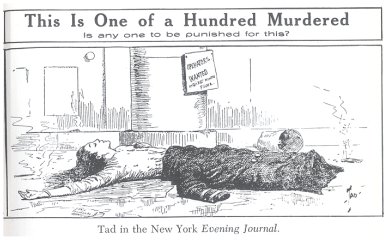
History 3090
Fall 2007 K.L. MacKay
Triangle Factory Fire

| Assignment | Discussion Focus and Written Responses |
| "Shirt" by Robert Pinsky | 3rd response paper: What is Pinsky asking us to consider in his poem "shirt"? How is he using the Triangle fire as part of his argument? Due: October 17 |
| Triangle by David Von Drehle | students will guide individual chapters 3rd Formal paper: "The Triangle fire of March 25, 1911, was for ninety years the deadliest workplace disaster in New York History--and the most significant." How does Von Drehle take us into the world of the workers and support his analysis of the importance of this world to our understanding of America's past? Draft for peer review due: November 9; final draft due: November 12 |
| web sites | students will comment on images: November 7 |
Required Reading:
The back, the yoke, the yardage. Lapped seams,
The nearly invisible stitches along the collar
Turned in a sweatshop by Koreans or Malaysians
Gossiping over tea and noodles on their break
Or talking money or politics while one fitted
This armpiece with its overseam to the band
Of cuff I button at my wrist. The presser, the cutter,
The wringer, the mangle. The needle, the union,
The treadle, the bobbin. The code. The infamous blaze
At the Triangle Factory in nineteen-eleven.
One hundred and forty-six died in the flames
On the ninth floor, no hydrants, no fire escapes--
The witness in a building across the street
Who watched how a young man helped a girl to step
Up to the windowsill, then held her out
Away from the masonry wall and let her drop.
And then another. As if he were helping them up
To enter a streetcar, and not eternity.
A third before he dropped her put her arms
Around his neck and kissed him. Then he held
Her into space, and dropped her. Almost at once
He stepped up to the sill himself, his jacket flared
And fluttered up from his shirt as he came down,
Air filling up the legs of his gray trousers--
Like Hart Crane's Bedlamite, "shrill shirt ballooning."
Wonderful how the pattern matches perfectly
Across the placket and over the twin bar-tacked
Corners of both pockets, like a strict rhyme
Or a major chord. Prints, plaids, checks,
Houndstooth, Tattersall, Madras. The clan tartans
Invented by mill-owners inspired by the hoax of Ossian,
To control their savage Scottish workers, tamed
By a fabricated heraldry: MacGregor,
Bailey, MacMartin. The kilt, devised for workers
to wear among the dusty clattering looms.
Weavers, carders, spinners. The loader,
The docker, the navy. The planter, the picker, the sorter
Sweating at her machine in a litter of cotton
As slaves in calico headrags sweated in fields:
George Herbert, your descendant is a Black
Lady in South Carolina, her name is Irma
And she inspected my shirt. Its color and fit
And feel and its clean smell have satisfied
both her and me. We have culled its cost and quality
Down to the buttons of simulated bone,
The buttonholes, the sizing, the facing, the characters
Printed in black on neckband and tail. The shape,
The label, the labor, the color, the shade. The shirt.
Triangle Fire Student Opinion Poll:
Employers are entitled to make all decisions regarding company wages and working conditions. Yes__ No__
Women should be treated like equals on the job and in labor unions. Yes__ No__
Government has a responsibility to protect workers by establishing standards for minimum wages, maximum hours, child labor and workplace safety. Yes__ No__
The rich deserve to keep all their money. They should not be taxed on it, but should be trusted to use it wisely. Yes__ No__
Labor unions are necessary. Yes__ No__
(Source: http://www.ashp.cuny.edu/ushi/triangle.htm)
| Nationality | Number |
Average Weekly Wage
|
Percentage Earning More than $7.50 per Week
|
| Males: | |||
| English | 1,563 | $11.39 | 95.8% |
| German | 538 | 11.17 | 95.0 |
| French | 234 | 11.07 | 96.6 |
| Irish | 551 | 10.21 | 94.9 |
| Russian | 170 | 8.59 | 77.1 |
| Polish | 375 | 8.01 | 50.7 |
| Lithuanian | 550 | 7.82 | 58.2 |
| Syrian | 334 | 7.33 | 31.1 |
| Southern Italian | 1,371 | 6.84 | 27.9 |
| Females: | |||
| German | 211 | $9.53 | 82.0% |
| French | 165 | 9.32 | 67.9 |
| Scottish | 115 | 9.06 | 90.4 |
| Canadian | 523 | 8.64 | 72.5 |
| English | 687 | 8.39 | 57.1 |
| Irish | 495 | 8.24 | 52.7 |
| Russian | 123 | 7.24 | 25.2 |
| Lithuanian | 263 | 7.14 | 31.6 |
| Polish | 182 | 7.10 | 29.1 |
| Southern Italian | 902 | 6.39 | 6.9 |
(Source: http://www.oah.org/pubs/magazine/progressive/barrett.html)